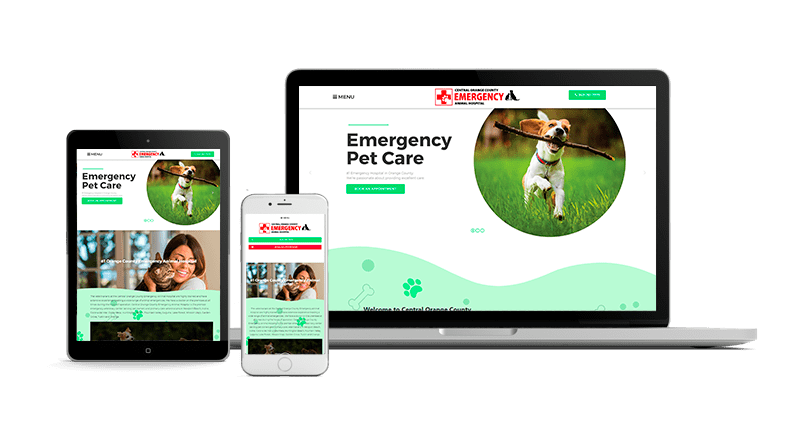Like many sectors today, the veterinary industry is undergoing a digital metamorphosis. As pet owners increasingly turn to the Internet for services, veterinarians, veterinary hospitals, and pet care professionals are presented with many opportunities. Grasping these trends is pivotal for those who wish to succeed and lead in the new era of veterinary care.
Why Pet Owners Search Online
In today’s digital age, how we seek out and consume information has been revolutionized. As we turn to Google to find a restaurant, read reviews before purchasing a product, or watch YouTube tutorials to learn a new skill, pet care has not remained untouched by this digital transformation. With the vast expanse of the Internet at their fingertips, pet owners are increasingly bypassing traditional methods of seeking veterinary services in favor of online resources. Here’s why:
Convenience and 24/7 accessibility: The modern consumer demands convenience. Gone are the days when pet owners would search through a physical directory or rely on word-of-mouth alone. Today’s pet parent is tech-savvy and expects to find services with a few clicks or taps. The digital realm offers 24/7 accessibility, a boon for those dealing with pet emergencies outside regular hours or seeking answers to their pet-related queries in the wee hours.
Seeking Reviews and Testimonials: In the era of Yelp and Google Reviews, online reputation is paramount. Potential clients often gauge the reliability of a vet service based on feedback from other pet owners. A solid online reputation, built through genuine positive reviews, can be a game-changer.
Telemedicine and Online Consultations: The pandemic spurred an unprecedented shift towards telemedicine. Online consultations have become a staple, not an outlier. They offer a safe, efficient, and stress-free option for both pet and owner, eliminating the need for physical visits for routine check-ups or minor issues.
How Veterinary Services are Discovered Online
The digital landscape has evolved rapidly over the past few decades, transforming how businesses operate and connect with their audiences. Veterinary services, too, are adapting to this shift, recognizing the multitude of online avenues that potential clients utilize to seek care for their beloved pets. Understanding and leveraging these avenues can set a veterinary practice apart from its competition.
Search Engines and Ranking
The Power of Organic Search: Most of today’s online experiences begin with a search engine. Whether a pet owner searches for “veterinary clinics near me” or “how to treat a cat’s cold,” search engines like Google act as gateways to content. This makes search engines critical for veterinarians.
To harness the power of organic search, it’s imperative to ensure that a veterinary practice’s website is optimized. An optimized website doesn’t just mean a fast-loading site with an attractive design. It means the site is rich in content relevant to potential clients. This includes detailed service descriptions, informative blog posts, client testimonials, and more.
The Art of SEO: Veterinary SEO, or Search Engine Optimization, enhances a website’s visibility on search engines. By incorporating relevant keywords, maintaining mobile-friendly designs, and keeping up with search engine algorithms, veterinary practices can improve their chances of appearing on the first page of search results. Most users rarely venture past this first page, so its importance cannot be overstated. For instance, a veterinary clinic in Austin might optimize its site content with terms like “Austin pet clinic” or “emergency vet services in Austin” to tap into local search queries.
Social Media and Online Communities
The Visual Appeal of Platforms like Instagram: In an era where visuals reign supreme, platforms like Instagram offer veterinary services a unique opportunity to connect with audiences in a visually engaging manner. These platforms showcase a clinic’s facilities, share heartwarming patient recovery stories or host live Q&A sessions. Posting regular behind-the-scenes looks into daily clinic operations can humanize a practice, making it more relatable and appealing to potential clients.
Engaging with Online Pet Communities: Beyond the popular social media platforms, veterinarians can establish a robust presence in a wealth of niche online communities. Places like Reddit’s r/Pets or local Facebook pet groups have members actively seeking advice and recommendations. Veterinarians can participate in these platforms, not in a promotional capacity, but as experts offering genuine advice. This boosts their image as knowledgeable professionals and indirectly brings attention to their services. For example, a vet offering insights into a particular pet health issue on r/Pets can subtly mention their clinic, leading interested users to explore their services.
In conclusion, the online ecosystem offers a multifaceted platform for veterinary services to enhance their visibility and engagement. By effectively recognizing and utilizing these platforms, veterinarians can extend their reach and establish a trusted and reputable brand image in the digital world.
Digital Marketing Essentials for Veterinarians
In today’s modern world, veterinarians can’t afford to overlook the significance of online marketing. Leveraging various digital tools and platforms is crucial to stay relevant and reach a broader audience. Here’s a deep dive into essential components of digital marketing for veterinary professionals:
Website Fundamentals
The Importance of a Strong Web Foundation: Think of a veterinary website design as the digital storefront of a vet practice. First impressions matter; a well-designed, intuitive website can differentiate between gaining a client or losing them to competitors.
Key Elements to Consider
Clear Service Listings: Detail the various services, from general check-ups to surgeries and emergency care.
Certifications: Display any professional certifications or affiliations, showcasing expertise and credibility.
Contact Details: Ensure the clinic’s address, phone number, and email are easily accessible.
Client Testimonials: Showcase honest feedback from satisfied pet owners to build trust.
Integrated Blog: Not just a platform for sharing pet care tips, a regularly updated blog enriched with keywords and quality healthcare content writing can improve search engine rankings. Additionally, well-researched articles can position the vet as an industry thought leader.
Social Media Engagement
Harnessing the Power of Different Platforms is vital. Each social media platform offers unique advantages, and understanding these can help tailor an effective engagement strategy.
Instagram: The visual-centric nature of Instagram makes it perfect for sharing captivating images and stories of pets. It’s an opportunity to celebrate successes, share the journey of pet recovery, and highlight the human touch of veterinary service.
Facebook: Its community-driven focus allows vets to connect with local pet owners. Facebook Groups can be particularly useful for building and engaging with a community, sharing updates, or hosting live sessions addressing common pet concerns.
Twitter (X): Ideal for real-time updates, vets can share informative articles, industry news, or quick tips, positioning themselves as up-to-date professionals.
Online Reviews and Testimonials
The Currency of Trust rules the online world. Online reviews are pivotal in influencing decisions in the digital age. They act as word-of-mouth recommendations, giving prospective clients an insight into the experiences of others.
Encourage Feedback: After successful appointments or treatments, politely encourage pet owners to share their experiences online. Positive reviews can significantly elevate a clinic’s reputation.
Addressing Criticism: Negative feedback can demonstrate a clinic’s commitment to excellence when addressed professionally and empathetically. A well-handled response can even convert a critic into a long-term client.
Highlighting Testimonials: Dedicate a section on the website or social media to showcase authentic, positive feedback, underscoring the trust and reliability of the veterinary practice.
Online Advertising
Targeted Reach for Better Conversions: While organic strategies lay the foundation, online advertising can supercharge a vet’s visibility, especially targeting specific demographics or localities.
Google Ads: Ideal for capturing users actively searching for veterinary services. With keyword targeting and local ad options, Animal Hospital PPC management can direct potential clients to a vet’s doorstep.
Facebook Ads: Its vast user base and detailed targeting options can help vets reach specific demographics, from pet owners in a particular locality to those with specific interests.
The digital landscape provides various tools and platforms for veterinarians to enhance their reach and marketing efforts and build a strong, trusted online brand. By integrating these essentials, vets can attract more clients and foster long-term relationships built on trust and quality service.
Empowering the Next Generation: Digital Strategies for Veterinary Students
The digital age presents a unique opportunity for veterinary students and newcomers to build a personal brand even before entering the field entirely. Platforms like LinkedIn offer networking opportunities, while personal blogs or YouTube channels can serve as platforms to share experiences, research findings, or opine on industry trends.
The Future is Here: Boost Your Vet Practice Today
The veterinary industry is on the cusp of a digital revolution. By understanding current trends and leveraging available opportunities, veterinarians and pet care professionals can elevate their services, reach a broader audience, and solidify their position in a competitive market. The future is digital, and for those ready to embrace it, the sky’s the limit.
To get started in a world of limitless opportunities, throw us a bone and let our marketing experts take on your marketing plan or complete veterinary marketing strategy. If you have something specific in mind, let us know how we can help you and your practice succeed.




